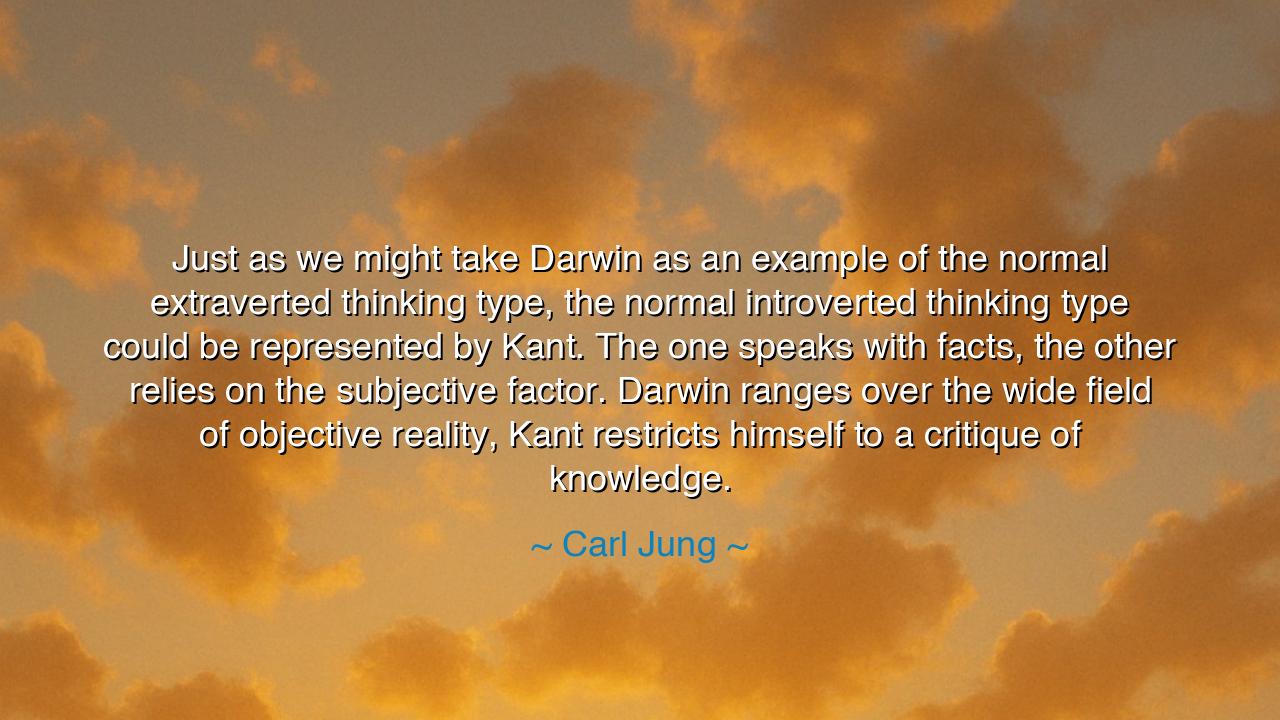
Just as we might take Darwin as an example of the normal
Just as we might take Darwin as an example of the normal extraverted thinking type, the normal introverted thinking type could be represented by Kant. The one speaks with facts, the other relies on the subjective factor. Darwin ranges over the wide field of objective reality, Kant restricts himself to a critique of knowledge.






The wise physician of the soul, Carl Jung, once proclaimed: “Just as we might take Darwin as an example of the normal extraverted thinking type, the normal introverted thinking type could be represented by Kant. The one speaks with facts, the other relies on the subjective factor. Darwin ranges over the wide field of objective reality, Kant restricts himself to a critique of knowledge.” In these words lies not only the distinction of two men, but the unveiling of two eternal paths upon which the human mind may walk.
For the extraverted thinker, as Jung names it, is the explorer, the one who delights in the vast field of objective reality. He looks outward with a gaze that seeks the laws of nature, the evidence of stone, the movement of stars, the branching of species. In Charles Darwin, the father of evolution, this spirit lived with unyielding devotion. He charted the isles of the Galápagos, he traced the bones of life’s long struggle, and with his facts he shaped a new vision of mankind’s place in the cosmos. His strength was in his gaze outward, ever upon the world, uncovering its hidden order.
But the introverted thinker turns inward, away from the panorama of nature, and descends into the cavern of the mind itself. In Immanuel Kant, this force was supreme. He did not sail oceans, nor chase the tracks of beasts, but instead labored within the invisible sea of thought. His work, the Critique of Pure Reason, was not a catalog of facts, but a reckoning with the very conditions of knowledge. He sought to understand how the mind shapes the world it beholds, how the subjective factor is not a shadow upon truth but the very lens through which truth is perceived.
See how these two men, though different, stand as pillars of human striving. Darwin reveals the grandeur of life as it unfolds in countless forms; Kant reveals the framework of the very thought that allows us to call something “life.” One speaks with facts, the other with principles. One ranges wide, the other digs deep. And thus humanity is nourished by both: by the expansion of its horizons, and by the deepening of its roots. Without Darwin, we might not see the kinship of all creatures. Without Kant, we might not understand the limits of our own knowing.
History shows us again and again the danger of favoring one path alone. A people devoted only to facts may become blind to the meaning of those facts, and sink into soulless calculation. A people lost only in subjectivity may spin endless webs of thought without anchor in reality. But when both paths are honored—when the Darwin and the Kant within us are given their due—then knowledge flourishes as both fruitful and wise.
Consider the story of the great polymath Leonardo da Vinci. He was both scientist and philosopher, both observer of anatomy and dreamer of principles. He dissected bodies to know the sinews of man, but he also reflected on the mystery of sight, of proportion, of beauty. In him the extraverted and introverted thinker embraced, and from that union came wonders still admired today. His example is proof that the truest wisdom walks neither one path nor the other alone, but balances the outer and the inner realms.
What, then, is the lesson for those who live now? It is this: do not exalt one mode of thought while despising the other. If you are a Darwin, learn also from Kant; if you are a Kant, listen too to Darwin. Let your mind move outward to explore the world, but also inward to question how you see. For the seeker of truth must learn not only to gather knowledge, but to test the vessel through which knowledge pours.
In your own life, practice this balance. When you read, ask not only what is said, but how you perceive it. When you work, gather your facts, but also reflect on the principles that guide their meaning. Do not fear the outer world, nor shun the inner world—walk with both. For it is in the union of objective reality and subjective wisdom that the human spirit grows whole, and thus may you, like the ancients, touch both the earth and the heavens with the strength of your mind.






AAdministratorAdministrator
Welcome, honored guests. Please leave a comment, we will respond soon